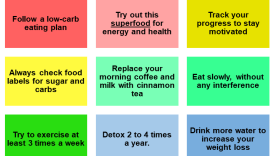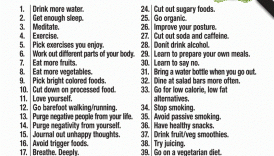Healthy Habits That Will Last a Lifetime: A Comprehensive Guide
Importance of Healthy Habits
Healthy habits form the foundation of a vibrant life. They empower individuals to enhance their well-being, improve productivity, and ensure longevity. Establishing routines around nutrition, physical activity, and mental wellness fosters a balanced lifestyle that can lead to significant health benefits. For example, when someone chooses to incorporate more fruits and vegetables into their diet, they may notice an increase in energy levels and a decrease in midday slump. Some core aspects of healthy habits include:
- Healthy Habits That Will Last a Lifetime: A Comprehensive Guide
- Importance of Healthy Habits
- Setting Realistic Goals
- Nutrition
- Balanced Diet
- Meal Planning
- Physical Activity
- Exercise Routine
- Incorporating Movement into Daily Life
- Mental Health
- Stress Management
- Practicing Mindfulness
- Sleep
- Importance of Quality Sleep
- Creating a Bedtime Routine
- Hydration
- Benefits of Staying Hydrated
- Tips for Drinking Enough Water
- Social Connections
- Building Supportive Relationships
- Maintaining Healthy Boundaries
- Healthy Habits at Work
- Ergonomic Practices
- Healthy Snack Options
- Mindful Technology Use
- Digital Detox Strategies
- Setting Screen Time Limits
- Self-Care
- Prioritizing Personal Wellbeing
- Finding Activities That Bring Joy
- Regular exercise: Engaging in physical activities boosts mood and combats stress.
- Balanced nutrition: Eating a variety of whole foods supports bodily functions.
- Quality sleep: A restful night enhances overall recovery and cognitive performance.
Setting Realistic Goals
Moving from understanding the importance of healthy habits, the next step is to set achievable and realistic goals. Goals serve as signposts, guiding individuals in their journey toward better health. Instead of aiming for drastic changes, consider:
- SMART Goals: Specific, Measurable, Achievable, Relevant, and Time-bound.
- Incremental changes: Start small; for instance, if you aim to exercise, begin with just 15 minutes a day.
- Celebrating progress: Acknowledge small victories to foster motivation and perseverance.
By focusing on realistic goals, individuals are more likely to maintain their healthy habits long-term.
Nutrition
Balanced Diet
Transitioning from setting realistic goals, the next critical step in fostering healthy habits is focusing on nutrition. A balanced diet is essential for maintaining energy levels and supporting overall health. It prioritizes a variety of food groups, ensuring that the body receives the necessary nutrients. A balanced plate typically includes:
- Fruits and Vegetables: Aim for at least five servings a day for vital vitamins and minerals.
- Whole Grains: Opt for brown rice, whole-wheat bread, and quinoa to provide fiber and energy.
- Lean Proteins: Include sources like chicken, fish, beans, and tofu to aid muscle repair and growth.
- Healthy Fats: Incorporate avocados, nuts, and olive oil to support brain health.
Meal Planning
Once you grasp the components of a balanced diet, meal planning becomes your best ally. This process not only saves time but also helps avoid unhealthy impulse eating. A simple meal planning strategy involves:
- Creating a Weekly Menu: Outline meals for each day, incorporating varied foods.
- Grocery Lists: Make a list based on your menu to streamline shopping.
- Batch Cooking: Prepare larger quantities of meals and store them for busy days.
By integrating these meal-planning techniques, individuals can ensure that nourishing choices are consistently available, making it easier to stick to a balanced diet.
Physical Activity
Exercise Routine
Building on the foundation of nutrition, the next vital component of healthy living is physical activity. Establishing a structured exercise routine is essential for maintaining fitness and overall well-being. Whether it’s engaging in cardio, strength training, or flexibility exercises, finding what resonates with you can make all the difference. Consider incorporating:
- Cardiovascular Exercises: Such as jogging, swimming, or cycling for heart health.
- Strength Training: Lifting weights or body-weight exercises (like push-ups) to build muscle.
- Flexibility and Balance Work: Including yoga or Pilates to improve mobility and reduce injury risk.
Keeping exercise enjoyable, like joining a dance class or hiking with friends, can help maintain commitment.
Incorporating Movement into Daily Life
While carving out time for exercise is crucial, integrating movement into daily routines enhances overall activity levels. Simple adjustments can significantly impact your health without requiring a formal workout session. Here are a few practical tips:
- Take the Stairs: Opt for stairs instead of the elevator whenever possible.
- Walk or Bike for Short Trips: Rather than using the car for quick errands, consider walking or biking.
- Set Movement Reminders: Use a phone alarm to stand up and stretch every hour while working.
By embracing these small changes, individuals can effortlessly incorporate physical activity into their daily lives, promoting a healthier lifestyle overall.
Mental Health
Stress Management
After discussing the importance of physical activity, it’s essential to focus on mental health, particularly stress management. Stress is a common companion in our fast-paced lives, but learning to manage it effectively can enhance both mental and physical well-being. Implementing stress management techniques can be transformative. Consider these strategies:
- Deep Breathing Exercises: Focusing on your breath can help calm your mind and reduce anxiety.
- Regular Breaks: Pausing during the day to relax or go for a short walk can recharge your energy and clarity.
- Time Management: Prioritizing tasks can prevent overwhelm and help maintain a balanced workload.
For example, dedicating a few minutes each day for a quick mindfulness session may significantly lower stress levels.
Practicing Mindfulness
Continuing from stress management, practicing mindfulness can be an incredible tool for enhancing mental health. Mindfulness involves staying present, fully experiencing the moment, and cultivating awareness of thoughts and feelings without judgment. Some effective mindfulness practices include:
- Meditation: Dedicate a few moments daily to sit quietly and focus on your breath.
- Mindful Eating: Savor your meals, paying attention to flavors and textures, promoting a healthier relationship with food.
- Journaling: Writing down thoughts and emotions can help process feelings and foster self-reflection.
By integrating stress management and mindfulness techniques into daily life, individuals can create a quieter mind, leading to improved overall health and a deeper sense of well-being.
Sleep
Importance of Quality Sleep
With our focus on mental health, it’s essential to understand the undeniable connection between sleep and overall well-being. Quality sleep is not just a luxury; it’s a crucial pillar of health. Adequate sleep supports cognitive function, emotional regulation, and physical health, ensuring the body can repair and rejuvenate. Consider these benefits of proper sleep:
- Enhanced Focus and Memory: A well-rested mind is more alert and capable of retaining information.
- Mood Regulation: Sleep plays a significant role in emotional stability, reducing anxiety and irritability.
- Physical Health: Quality sleep strengthens the immune system and helps regulate weight.
On the other hand, poor sleep can lead to a myriad of health issues, from chronic fatigue to weakened immune responses.
Creating a Bedtime Routine
To achieve quality sleep, establishing a consistent bedtime routine is vital. This routine signals to the body that it’s time to wind down, promoting a smoother transition to sleep. Here are some effective strategies for a calming bedtime routine:
- Set a Regular Sleep Schedule: Go to bed and wake up at the same time each day, even on weekends.
- Limit Screen Time: Reduce exposure to screens at least one hour before bed to lower blue light interference.
- Engage in Relaxing Activities: Consider reading a book, practicing gentle yoga, or taking a warm bath to relax before bed.
By prioritizing quality sleep and creating a soothing bedtime routine, individuals can greatly enhance their overall health, setting the stage for better days ahead.
Hydration
Benefits of Staying Hydrated
Continuing from the importance of quality sleep, hydration is another fundamental aspect of maintaining optimal health. Staying well-hydrated offers numerous benefits that can greatly impact daily life. Water is essential for nearly every function in the body, from regulating temperature to aiding digestion. Some key benefits of staying hydrated include:
- Increased Energy Levels: Dehydration can lead to fatigue, while proper hydration helps boost energy.
- Enhanced Cognitive Function: Drinking enough water improves concentration and mood, keeping the mind sharp.
- Healthy Skin: Staying hydrated contributes to skin elasticity and a radiant complexion.
For instance, when someone makes a conscious effort to drink more water, they might notice an increase in their overall energy and mental clarity.
Tips for Drinking Enough Water
To reap the benefits of hydration, it’s essential to incorporate strategies for meeting daily water intake. Consider these practical tips:
- Carry a Reusable Water Bottle: Keeping water on hand serves as a reminder to sip throughout the day.
- Set Daily Goals: Aim for a certain number of glasses or liters, adjusting based on activity level and climate.
- Infuse Water with Flavor: Adding fruits or herbs, like lemon or mint, can make drinking water more appealing.
By focusing on hydration and employing these tips, individuals can enhance their overall health and well-being, ensuring they feel their best every day.
Social Connections
Building Supportive Relationships
Following the crucial aspect of hydration, fostering social connections significantly contributes to mental and emotional well-being. Building supportive relationships can provide a strong network that promotes resilience and happiness. Positive interactions with family and friends can lead to increased feelings of belonging and reduced stress. To foster these beneficial relationships, consider the following:
- Prioritize Quality Time: Set regular catch-ups with loved ones, even if it’s just a phone call.
- Engage in Shared Interests: Join clubs or groups that align with personal hobbies to meet like-minded individuals.
- Show Appreciation: A simple thank-you or affirmation can strengthen bonds and encourage reciprocity.
For example, a friend who consistently reaches out to share their triumphs and struggles will likely inspire a supportive environment.
Maintaining Healthy Boundaries
While building connections is essential, it’s equally important to establish healthy boundaries within these relationships. Healthy boundaries promote respect and prevent feelings of overwhelm. Here are some strategies for maintaining boundaries:
- Communicate Clearly: Express your needs and limits honestly to avoid misunderstandings.
- Learn to Say No: Prioritize your well-being by declining commitments that may compromise your time or energy.
- Check In With Yourself: Regularly assess how relationships make you feel and adjust your involvement as necessary.
By balancing supportive relationships with well-defined boundaries, individuals can cultivate a nurturing social environment that enhances overall happiness and mental health.
Healthy Habits at Work
Ergonomic Practices
Moving from the significance of social connections, the workplace offers another key opportunity to integrate healthy habits. Ergonomic practices are essential in creating a comfortable and productive work environment. Proper ergonomics helps prevent strain and injuries, especially during long hours at a desk. Here are some effective ergonomic tips:
- Adjust Your Chair: Aim for a chair that supports your lower back and keeps your feet flat on the floor.
- Monitor Height: Position your computer screen at eye level to reduce neck strain.
- Use Proper Keyboard and Mouse Placement: Keep these devices close to your body to minimize reaching.
Implementing these practices can lead to increased comfort and focus throughout the workday.
Healthy Snack Options
Alongside ergonomic practices, nourishing your body with healthy snacks can boost energy and productivity at work. Rather than reaching for sugary snacks, consider these healthier alternatives:
- Fresh Fruits: Apples, bananas, or berries are great options that provide quick energy.
- Nuts and Seeds: A small handful can be a satisfying source of protein and healthy fats.
- Veggie Sticks with Hummus: A crunchy, delicious way to receive essential vitamins.
By incorporating ergonomic practices and healthy snack options, individuals can enhance their wellness and performance in the workplace, ultimately contributing to a more fulfilling work experience.
Mindful Technology Use
Digital Detox Strategies
Transitioning from cultivating healthy habits at work, it’s important to address the impact of technology on our lives. Mindful technology use can enhance overall well-being, ensuring that screens don’t dominate our attention. Engaging in digital detox strategies can help individuals reconnect with themselves and their surroundings. Consider these effective digital detox strategies:
- Scheduled Device-Free Time: Designate specific hours in your day to unplug, such as during dinner or right before bed.
- Digital Minimalism: Evaluate your apps and subscriptions; keep only those that add value to your life.
- Nature Breaks: Spend time outdoors without technology, fostering a sense of peace and presence.
For example, taking a weekend off social media can refresh your mindset and boost creativity.
Setting Screen Time Limits
In addition to detoxing, setting screen time limits can create a healthier relationship with technology. Establishing boundaries helps prevent fatigue and promotes better focus on immediate tasks. Here are some practical tips for managing screen time:
- Utilize Apps for Monitoring: Use tools that track your daily usage to stay aware of how much time you spend online.
- Set Timers for Tasks: Allocate specific blocks of focused work time followed by breaks away from screens.
- Create a Wind Down Routine: Designate the last hour before bed as screen-free to prepare your mind for restful sleep.
By incorporating digital detox strategies and setting screen time limits, individuals can foster a mindful approach to technology that supports their overall health and enhances personal interactions.
Self-Care
Prioritizing Personal Wellbeing
Building from the importance of mindful technology use, self-care emerges as a vital practice for nurturing personal health and happiness. Prioritizing personal well-being requires intentional effort and acknowledgment of one’s needs. It’s not a selfish act; rather, it allows individuals to recharge and show up fully in their lives. Here are some effective ways to prioritize self-care:
- Schedule “Me Time”: Block out time in your calendar each week just for you—consider it a non-negotiable appointment.
- Practice Self-Compassion: Treat yourself with kindness, especially during challenging times; acknowledge that it’s okay not to be perfect.
- Regular Check-Ins: Reflect on your emotional and physical state weekly to identify areas needing attention.
For instance, a quick Sunday ritual of journaling feelings can significantly enhance self-awareness and mental clarity.
Finding Activities That Bring Joy
In conjunction with prioritizing your well-being, discovering activities that bring joy is essential for a balanced life. Engaging in enjoyable pursuits not only enriches personal time but also boosts mental health. Consider these approaches to find joy:
- Explore New Hobbies: Try painting, gardening, or any activity you’ve always wanted to learn; new experiences can reignite excitement.
- Reconnect with Nature: Spend time outdoors—whether it’s hiking, walking on the beach, or simply enjoying a park—nature nurtures the soul.
- Cultivate Gratitude: Keep a gratitude journal to remind yourself of the little joys in everyday life.
By investing time in self-care and embracing activities that spark joy, individuals can foster a resilient mindset, ensuring they thrive in both their personal and professional lives.





